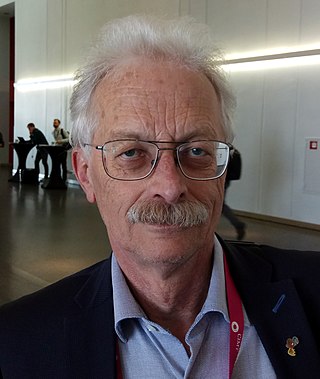Immunotherapy or biological therapy is the treatment of disease by activating or suppressing the immune system. Immunotherapies designed to elicit or amplify an immune response are classified as activation immunotherapies, while immunotherapies that reduce or suppress are classified as suppression immunotherapies. Immunotherapy is under preliminary research for its potential to treat various forms of cancer.

Personalized medicine, also referred to as precision medicine, is a medical model that separates people into different groups—with medical decisions, practices, interventions and/or products being tailored to the individual patient based on their predicted response or risk of disease. The terms personalized medicine, precision medicine, stratified medicine and P4 medicine are used interchangeably to describe this concept though some authors and organisations use these expressions separately to indicate particular nuances.

Centromere protein B also known as major centromere autoantigen B is an autoantigen protein of the cell nucleus. In humans, centromere protein B is encoded by the CENPB gene.

Cyclin-dependent kinase 7, or cell division protein kinase 7, is an enzyme that in humans is encoded by the CDK7 gene.

Protein SSX2 is a protein that in humans is encoded by the SSX2 gene.

Protein SSX4 is a protein that in humans is encoded by the SSX4 gene.

U3 small nucleolar RNA-associated protein 14 homolog A is a protein that in humans is encoded by the UTP14A gene.

Serologically defined colon cancer antigen 8 is a protein that in humans is encoded by the SDCCAG8 gene. This protein localizes to the centrioles.
Adoptive cell transfer (ACT) is the transfer of cells into a patient. The cells may have originated from the patient or from another individual. The cells are most commonly derived from the immune system with the goal of improving immune functionality and characteristics. In autologous cancer immunotherapy, T cells are extracted from the patient, genetically modified and cultured in vitro and returned to the same patient. Comparatively, allogeneic therapies involve cells isolated and expanded from a donor separate from the patient receiving the cells.

Hans-Georg Rammensee is a German immunologist and cancer researcher. He has been Chair Professor and Head of the Department of Immunology at the University of Tübingen since 1996. Rammensee has contributed essentially to the research fields of MHC biology and tumor immunology and to the development of cancer immunotherapies.
The mutanome is the entirety of somatic cancer mutations in an individual tumor.
Neoepitopes are a class of major histocompatibility complex (MHC) bounded peptides. They represent the antigenic determinants of neoantigens. Neoepitopes are recognized by the immune system as targets for T cells and can elicit immune response to cancer.
Individualized cancer immunotherapy, also referred to as individualized immuno-oncology, is a novel concept for therapeutic cancer vaccines that are truly personalized to a single individual.

An mRNAvaccine is a type of vaccine that uses a copy of a molecule called messenger RNA (mRNA) to produce an immune response. The vaccine delivers molecules of antigen-encoding mRNA into immune cells, which use the designed mRNA as a blueprint to build foreign protein that would normally be produced by a pathogen or by a cancer cell. These protein molecules stimulate an adaptive immune response that teaches the body to identify and destroy the corresponding pathogen or cancer cells. The mRNA is delivered by a co-formulation of the RNA encapsulated in lipid nanoparticles that protect the RNA strands and help their absorption into the cells.
Edward F. Fritsch is a scientist in the field of molecular biology and cancer immunology.
RNA therapeutics are a new class of medications based on ribonucleic acid (RNA). Research has been working on clinical use since the 1990s, with significant success in cancer therapy in the early 2010s. In 2020 and 2021, mRNA vaccines have been developed globally for use in combating the coronavirus disease. The Pfizer–BioNTech COVID-19 vaccine was the first mRNA vaccine approved by a medicines regulator, followed by the Moderna COVID-19 vaccine, and others.

Uğur Şahin is a Turkish-German oncologist and immunologist. He is the Founder and CEO of BioNTech, which developed one of the major vaccines against COVID-19. His main fields of research are cancer research and immunology.

Özlem Türeci is a Turkish-German physician, scientist and entrepreneur. In 2008, she co-founded the biotechnology company BioNTech, which in 2020 developed the first messenger RNA-based vaccine approved for use against COVID-19. Türeci has served as BioNTech's chief medical officer since 2018. Since 2021, she has been Professor of Personalized Immunotherapy at the Helmholtz Institute for Translational Oncology (HI-TRON) and Johannes Gutenberg University Mainz. Türeci and her spouse, Uğur Şahin, have won a number of awards.
A nucleoside-modified messenger RNA (modRNA) is a synthetic messenger RNA (mRNA) in which some nucleosides are replaced by other naturally modified nucleosides or by synthetic nucleoside analogues. modRNA is used to induce the production of a desired protein in certain cells. An important application is the development of mRNA vaccines, of which the first authorized were COVID-19 vaccines.

Alberto Bardelli is an Italian geneticist and cancer researcher, expert in the field of precision medicine. He is a full professor of histology at the Department of Oncology, University of Turin and Scientific Director of IFOM, the AIRC Institute of Molecular Oncology.









